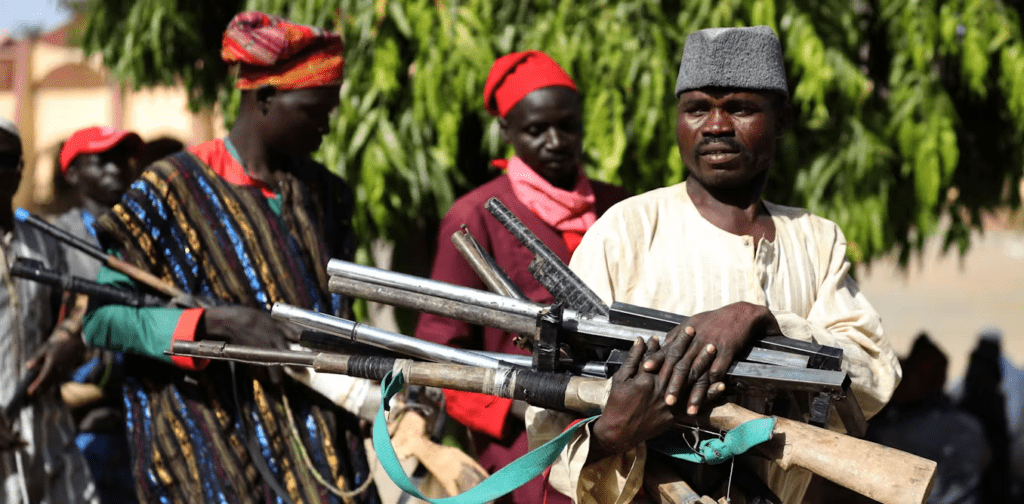Recent media releases have highlighted Lakurawa, the ‘new’ threat in Nigeria, however it turns out they are not as new as they originally appeared.
Who are Lakurawa?

Originally Lakurawa were herders who changed into a criminal group around 2016. According to eye witnesses they rejected the label ‘Boko Haram’ and referred to themselves as mujahideen, al-Qaeda or Ansaru. They were described as a unique group of herder-terrorist, who promote their own version of Islam, that deviates from mainstream sects. They seek to create a caliphate in the border regions and speak Arabic and Fulfulde, which is predominately spoken by Fulani people. There are also indications of connections to al-Qaeda in the Islamic Maghreb (AQIM) and Jama’at Nusrat al-Islam wal-Muslimin (JNIM).
History of Lakurawa
According to the Nigerian army, Lakurawa is a terrorist group, active in the North-West region of Nigeria, that emerged as a result of the coups that occurred in Niger last year. However, a book called ‘Importing Militant Jihadist’ by Murtala Ahmed Rufa’l (2023), establishes that they in fact, had historic connections to some communities in Sokoto since 1999.
Sokoto State is located in the North West of Nigeria, sharing boundaries with Niger Republic to the North, Kebbi State to the West and Zamfara State to the Southeast. It has 23 local governments and an estimated population about four million people, mostly Hausa-Fulani. However, some forest areas around Gudu, Tangaza, Gundumi and Tureta are thinly populated due to aridity.

The North-West has a long history of armed banditry due to the poverty and hunger in the region. A large quantity of the banditry issues originated from Zamfara State around 2011, spreading across the North-western regions, causing significant damage to 5 of the 7 states (Zamfara, Kaduna, Kebbi, Kasina and Sokoto).
In 2016-2017 the Zamfarawa bandits started activities in the Tangaza and Gudu border communities, which led to a meeting between the district head of Balle (Gudu local government), the district head of Gongono (Tangaza local government) and Alhaji Bello Wamakko (chairman of Miyetti Allah Cattle Breeders Association of Nigeria). During the meeting it was agreed that they would hire the Lakurawa from Mali, to fight the bandits. Funding and arming the very group who are now an issue.
At the time most villages and community leaders supported the idea of inviting the Lakurawa to end the challenges of banditry, due to the fear of the what was happening in the other states. At first Lakurawa fulfilled these expectations by winning the battle against the Zamfarawa bandits and returning some normality.
In 2017 Lakurawa based themselves at Gudu and Tangaza local government areas and established camps around Gwangwano, Mulawa, Wansaniya, and Tunigara, calling it Darul Islam. They married local women and recruited young people from the communities into jihadist activities. They started with less than 50 indigenous youth and increased to over 200, largely recruiting by offering stipends to young members.
As with other Islamic extremist groups they have attempted to implement sharia law in the communities by preaching in public squares, collecting taxes, lashing violators and forcing the herders to pay levies on their cattle under the guise of Zakat (religiously obligatory almsgiving).
According to locals, Lakurawa’s attempts at Islamizing villages were unpopular and the community leaders who first invited the jihadist soon sought to expel them. The traditional authorities and other local leaders tried out different means of countering the extremist ideas such as preaching against extremism and meeting with religious leaders that follow traditional versions of Islam. Despite these efforts, Tangaza community leaders were worried that some of the radical ideas preached had taken hold among segments of the youth.
Lakurawa’s activities spread outside of their immediate surroundings to include several attacks on local security forces, the ransacking of at least one military base and a dispute over an inheritance that resulted in Lakurawa killing a district head.
Current Lakurawa situation
Their campaign of violence continues to date leading to the attacks seen on the news. One such attack occurred on the 8th Nov 2024, in Mera Village in Augie local Government area of Kebbi State. Where at least 15 people were killed and a significant number of cows were rustled, during the assault. These reported attacks alongside the Nigerian announcements have highlighted Lakurawa’s presence to the world and led to an influx of interests in the group.
In November Zagazola Makama, a counterinsurgency publication focussed on the Lake Chad region reported that the group had killed five people in a series of attacks on Gueza, a village in the Dosso region of Niger republic. Five villagers were “strangled to death” with the publication linking the attacks to a personal dispute involving a Lakurawa leader. The attacks were alleged to be a retaliation following the village chief’s representative intervening to protect a woman whose family sent her away to evade the group leader’s marriage proposal.
The group are widely known to resort to violence to maintain control. Makama warned that without joint military efforts the Lakurawas would continue to escalate their threat. “Their connections to larger jihadist networks in the Sahel, such as Boko Haram and al-Qaeda, provide them with resources, including arms and logistical support,” the report added.
The group were “formally” recognized as a terror organization by the Nigerian Defence and Force Headquarters, adding to an already complex security landscape. The operations of groups such as Lakurawa continue to put strain on the livelihoods of local communities, which have long suffered at the hands of terrorist and bandit groups. However, the military high command has announced plans for ‘Operation Safe Corridor North-West’ which the military hopes will aid in dismantling the group through greater cohesion and intelligence sharing with the local population and by offering a pathway to rehabilitate and reintegrate Lakurawa and other ‘bandits’ in the region.
The Sokoto State Government has also reaffirmed its readiness to support military operations targeting Lakuwara in the state. Col Ahmed Usman (ret.) said the state welcomed the deployment of the Special Forces, cited positive results in the fight and urged residents to cooperate with the security agents by offering vital information with useful and timely tips.

